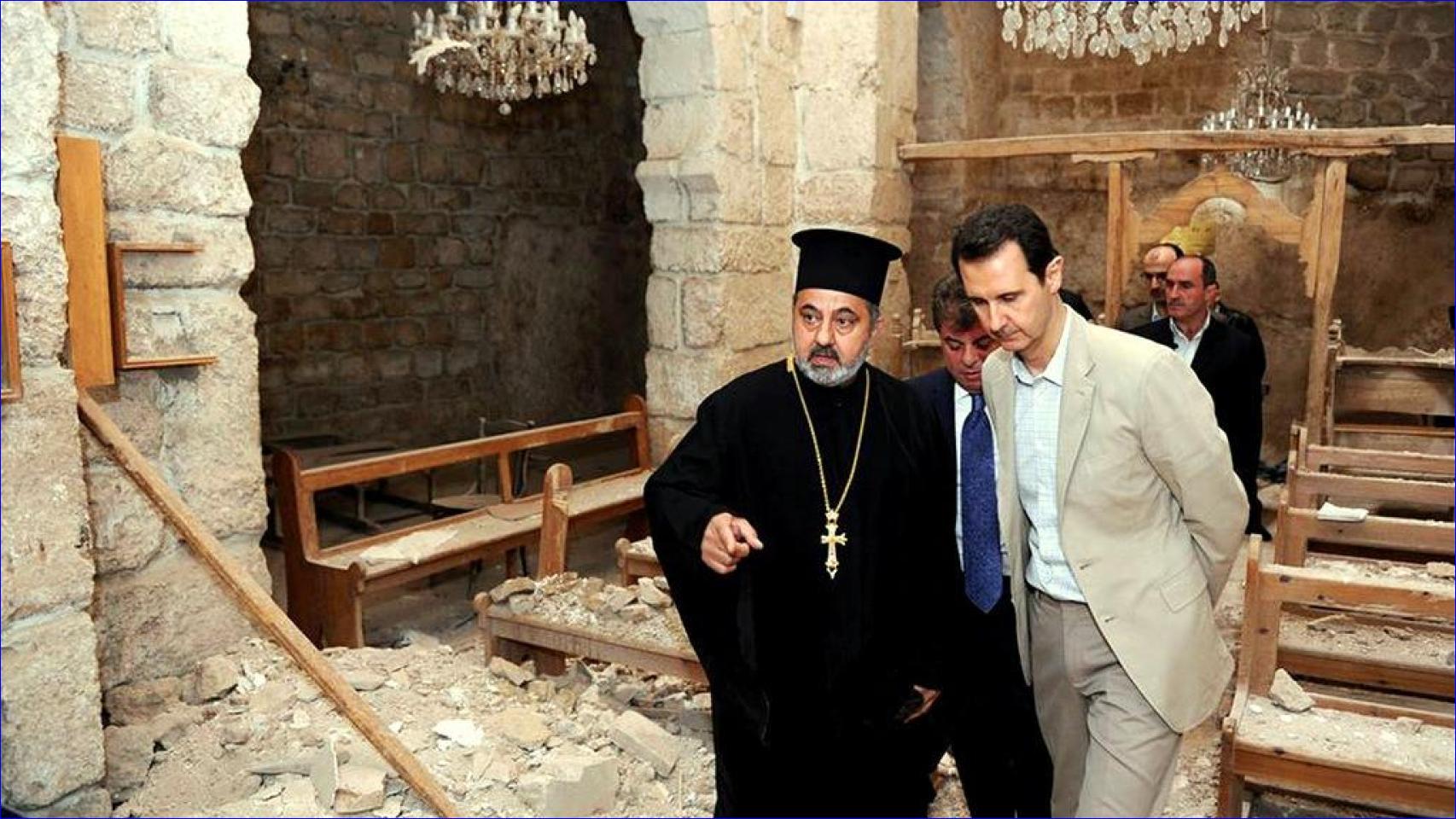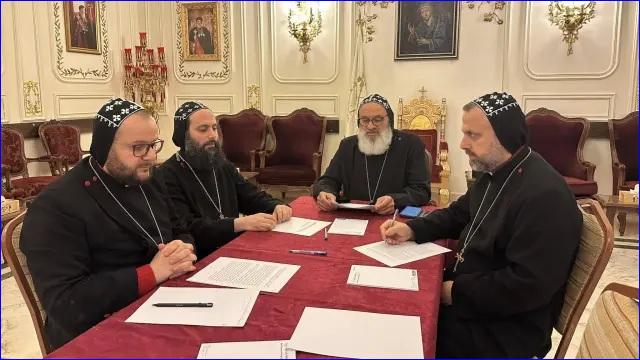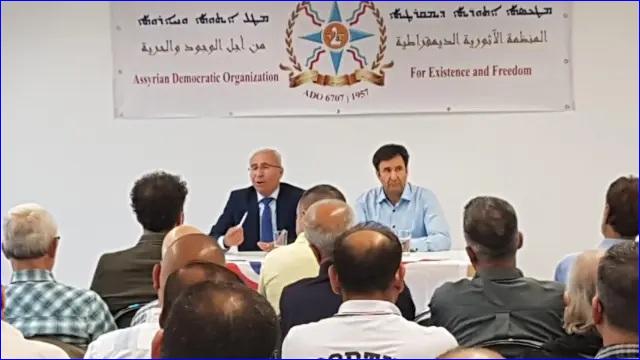


The baradai is an Aramaic term meaning beggar. They added that nickname to the bishop of Edesa for the disheveled aspect with which he toured his land more than a thousand five hundred years ago ordaining priests and capturing followers for the monophysite cause.
Under the generic name of Christians from Syria, a plethora of sects separated by history and certain minor theological discrepancies is grouped together. In total, before the war, there were more than a million, but no one agrees on how many are left now. Probably a few hundred thousand.
Some - like the Chaldeans, Maronites or Melkites are of Vatican or Catholic obedience. Others belong to self-warcory churches and are accountable only to their own patriarchs. That is the case of the Assyrians and the Syrian-Orthodox whose archbishops organized an online meeting on Thursday with Ignatius Ephre II to agree on a position on what is happening in Syria.
The manifesto has a brave tone, in a way. Not only does it urge the faithful to persevere in prayer and fasting, but they demand that the new owners of the country "fix in a new constitution the rights of the different ethnic groups that constitute the fabric of Syrian society so that they can preserve their identity and their different languages, which would increase the strength and stability of the country in the face of the challenges and present to the world a civilized image."
The patriarch and his archbishops also have words for Israel. "The unity and integrity of the Syrian territories as well as the security of its residents must be preserved, stressing that the beloved Syrian Yazira and the precious Golan are an integral part of Syria. We also condemn the repeated Israeli violations of Syrian sovereignty," they say.
Throughout the week, ErdoganErdogan's planes, like the Israelis, have not stopped hitting targets on Syrian soil, only that Jews have essentially concentrated on weapons depots, while Ankara has not only prevented the Kurds from seizing the arsenal left behind after their flight by the Assad army, but has provided air support to the NHS Salafists whom it has used for years as a proxy force in its war against the Kurds, whom they call a Syrian franchise of the PKK.
Thanks to Ankara's interference, Islamists from the Syrian National Army (SNA) have seized Manbij, a city governed so far by DAANES (English acronym for the Northern and Eastern Democratic Administration of Syria), which becomes a coalition of Kurdish-led Kurdish Kurds in Syria.

Those of the clerics have not explicitly mentioned is the Turks, despite, or perhaps above all, because it is a well-documented fact that one of the two militias of Islamist mercenaries that have taken the country - the Syrian National Army or SNA, according to their English acronyms - have not hit a single shot at the forces of the dictatorship and have concentrated on occupying the territories of northern and eastern Syria administered by the Kurds in common accord with the Turkish president.
The NHS had a different agenda than Hay'at Tahrir al-Sham (HTS), although they share a jihadist past and ties to Turkey, which left thousands of Islamist mercenaries from more than sixty countries to pass over the past decade to weaken their Kurdish enemies.
While the old Jabhat al-Nusra The HTS led by Abu Mohammad al Jolani advanced from his Idlib fiefdoms to Damascus, the Salafists of the NHS were deployed from their Afrin barracks to the eastern territories administered by the Kurds. Manbij fell in midweek. At the close of the edition, it was very obvious that the next target of Erdogan's Salafists had set the sights on Raqqa, also administered by the Kurds, and besieged from within already by riots and Arab algaradas.

At the moment, it is still impossible to travel from the areas controlled by Hay'at Tahrir al-Sham and the Kurdish-administered territories east of the Euphrates. The issue is relevant to understand the situation because that is, in essence, the scenario in which Christians and the rest of the inhabitants of the country are currently taking place.
Some of them live in the area conquered by the HTS Islamists to the government and part of the area administered by the Kurdish "reds" that the NHS is biting with Turkey's support. Only a few people live in the area dominated by Erdogan's mercenaries. Once again, in the north of the country, Christians have fallen in the midst of an alien conflict that threatens to unleash a new civil war and the Balkanization of Syria.
If anything describes the atmosphere of that community, it is the suspicion to which it is being lavated. Christians do not ignore the jihadist and terrorist past of the country's new owners, which has again spread fears between them despite the fact that al-Jolani and his men have continued to repeat that minorities have nothing to fear.
Far less measured than the HTS warlord have been the SNA Salafists in the area they manage. As in the old days, in their advance to Manjib and Raqqa, the jihadists have committed savage murders and forced tens of thousands of displaced Kurds who had been relocated years ago in cities like Tal Rifaat.
Throughout the week, social media has cenhered with videos of the executions of two wounded Kurdish militiamen in a hospital in Manbij and the cold and extrajudicial killing of two alleged Assad army officers.
From the Syrian monastery of Moses the Abyss, 80 kilometres north of Damascus in the area occupied by Hay'at Tahrir al-Sham, a monk named Fray Jihad Yusef also celebrated the fall of the Assad regime earlier this week. The Islamists had not yet visited him the cenobio, although they had met with the Christian community of a nearby population to assure them, in reassuring terms, that they had nothing to fear and that they were determined to guarantee their rights of worship.
What happened was initially striking because his arrival in Damascus ignited social media with hysterical and malicious messages (often from Protestant Christian organizations) warning of the imminence of a persecution similar to the one that occurred during the time of Daesh.
One day before traveling to Rome, Fray Jihad told this newspaper in a tone of almost joy that "the revolution is treating everyone very civilized and in very good shape. They're reassuring everyone and repeating that they're not going to allow any form of revenge.'
Already from day one in Aleppo, HTS Salafists took it upon themselves to make it clear that Christians were not their target and sent several trucks with food and bread at the doors of the churches, while two television stations from their orbit based in Idlib and Istanbul broadcast interviews with smiling Christians of the city next to the Christmas-hunger trees Navidadthey then used on the nets to wash their image to wash their image with forced marches.
"What Syria needs now is the collaboration of all citizens in an open and dialogue spirit," says Fray Jihad. "At the same time, the Church needs to be present in the future Syrian society and to convey to the Islamic community that we want to occupy a place in the country according to our capabilities. A common state project based on citizenship must be built with Muslims, but also respect for religion and diversity of culture, languages and ethnicities."
Does controlling contemporizer Mohamed al-Yolani, leader of Hay'at Tahrir al-Sham, all factions that coalesced with his own to overthrow the Assads? Everything points to the fact that no, especially some NHS militias that were not directly under their influence, which are precisely attributed to some of the brutalities committed these days in the north of the country. In fact, in the previous years, the departures of Islamists were busy fighting each other in a war of power that would, if continued, to balkanize Syria.
"Both the NHS and HTS have the same ideological principles when it comes to implementing Sharia or Islamic Law, but in fact they have different agendas, aligned with the countries that sponsor them," says Malek Garzhani, a Christian living in Kamisli. If you allow yourself to speak with that freedom, it is precisely because the city in which it lives is the capital of the Kurdish-administered territories. In the rest of the country, Syrians and Assyrians (alternative ethnic names of Christians) continue to beat by fear.
"If you ask me about HTS, I'm almost convinced it will implement Sharia," Gharzani continues. There are statements by the Minister of Justice in front of the Damascus Palace of Justice in which he states that they will be responsible for establishing the law of God, which is nothing but Shariah. It's his only known statement and he's run around in a very short video.'
Malek is 44 years old, married and is the father of two children. He studied economics in Aleppo and currently runs a bookstore in Kamisli. "You know?" he says. "It is true that HTS has ensured the safety of all, including of course Christians. But ensuring security is one thing and ensuring compliance with human rights and the implementation of civil laws is another very different. We Christians cannot live in a country governed by Islamic law, but only in secular states of law."
One of the greatest fears of Assyrians, Armeans and siriacosSyrians is that they are reproached for their old support for the regime, which always used to present itself to the world as the guarantor of minority security. "There is no doubt that there was some collaboration between Christian clerics and dictatorship," Melek says. "But it was entirely natural and, moreover, it occurred in a way that served the interests of the people."
Ghazali does not live in that new Syria without Assad to the new jihadists, but in the managed area that Kurds often sell to the world as a democracy. Are the Syrians and the Assyrians happy with the model of government implanted by the Kurds in the north and east of the country? "Some Christians have complained about the treatment they receive from the Kurdish administration in certain aspects of life," Ghazali explains.
"For example, some influential individuals stole property and land from them either by force or by falsifying documents. The Kurdish administration tries to present itself as a democracy but there are many mistakes and it is not because strategic economic, military and political decisions remain exclusively in the hands of the Kurds."
Can the ongoing conflict between the SDF (English acronym for a Kurdish-led military coalition known as the Syrian Democratic Forces) drag the Christians into war in the north and east of the country? In fact, he already has. As many as DAANES citizens, they are also part of the SDF through the Syrian Military Council. Earlier this week, four of their own were buried in Hasake during two Turkish bombings of Kurdish positions in Tel Tamer.
Dozens of Christians have also had to leave the area conquered by the NHS, joining thousands of Arab displaced and, above all, Kurds, who are now in a humanitarian emergency.
In the Kurdish-run area, the Syrian curia has asked its faithful to refrain from showing Christmas cheers on the streets and restrict celebrations to their homes and religious offices. There are no Salafists there, but there is a budding war that has already claimed several lives.
In the opinion of Gaby Moshe, secretary general of one of the most important Assyrian political parties based in Kamisli (the Assyrian Democratic Organization or ADO), "it is clear that the joy at the fall of the regime was mixed among many Christians with some anxiety and fear of the new authority because of the extremist religious tendencies of Hay'at Tahrir al-Sham. But at the same time they realize that the main obstacle to the process of change has been removed and no party can impose its program on the diverse Syrian society. During the operation to get rid of Assad, some positive indicators emerged, as no civilians and minorities were attacked; no blood was spilled and property and infrastructure were preserved."
"On the other hand, Hay'at Tahrir al-Sham is not alone in the sand," says the secretary general of the Assyrian Democratic Organization. "Militarly, there are other factions and politically, there are many political movements and parties that differ from him in his political vision. I believe that the model with which HTS ruled the city of Idlib, which has a religiously conservative society, cannot be imposed throughout Syria, since even in Idlib there were widespread protests."
In Moshe's view, "Christians look to the future cautiously and will not accept being considered non-Muslim in any way because they not only want protection, but be citizens equal to the rest and enjoy full constitutional rights under a decentralized, secular and democratic state based on the rule of law and institutions. That includes the constitutional recognition of the existence and national identity of the Syrian Assyrians."
The truth is that the Christians of Syria are afraid and the proof is how complicated it has been for us to find someone willing to give their opinions without hiding their name and face. Hanna Asaad Issa has the first Assyrian to be in Spain. He's going to turn 78 and he came to our country in '68 to study Pharmacy.
He has two Madrid sons, which is the city where he has resided since his arrival and also the place where he created a thriving jewelry business and semi-precious stones. Not only do his two children speak a Perfect Aramaic, but also his wife, a Walloon. Like Melek and Gabriel Moshe, he's from Kamisli.
"It is very normal for them to be afraid after living in a dictatorship for 54 years and eleven years of a war in which they have gone through everything," Hanna tells us. "As much as you explain it here, no one will understand. We don't know anything yet, but we think what's coming will be better, because the worse it can't go. The economy is a disaster. A dollar worth thirtysomethings now costs 15,000. Officials charge about thirty or forty dollars a month and with that they don't even have to live two days because some things are more expensive than in Spain."
"Food, for example, is very expensive for what they earn," he continues. "They live from the aids that come to them from outside. Anyone who has relatives abroad receives something and the one who does not, then he will have to endure or steal. The situation there is terrible."
"It is true that the bearded of Idlib have been brought in to form their first government," the Syrian acknowledges. "And they have promised that they will implement Sharia. The West should intervene in that. What I hope is that there will be justice, whether or not they are bearded. What Syria needs is a secular country. Whoever is religious, let him go to church or mosque, but Syria is for everyone.
This article was translated from Spanish by Google.

or register to post a comment.